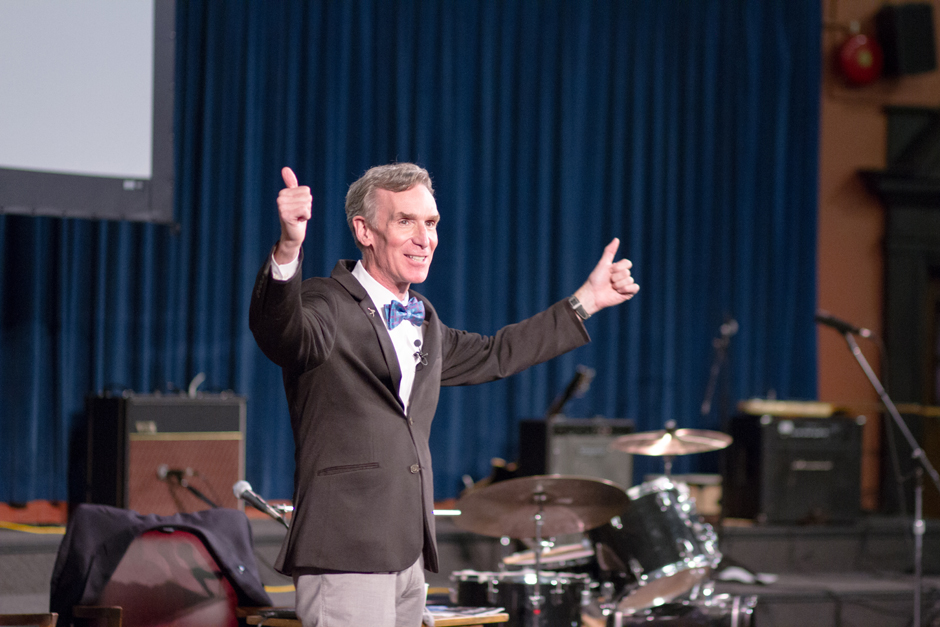On Oct. 1, space enthusiasts addressed the evolution of the Canadian space program as part of the International Astronautical Congress (IAC) 2014. The IAC theme this year, Our World Needs Space, hosted discussions that explored the way space inventions could be used on Earth. The panelists—some of the most respected names in Canadian planetary science—highlighted the spectrum of possibilities.
The talk welcomed over a thousand space aficionados to join Bill Nye, the Planetary Society CEO; Elizabeth Howell, senior writer for Universe Today; Gordon “Oz” Osinki, industrial research chair in Planetary Geology from the University of Western Ontario (UWO); and Canadian astronaut, Jeremy Hansen.
The topics focused on Canada and working in space with the Canadian Space Agency (CSA). The talk highlighted the fact that anyone from British Columbia to Nova Scotia has the opportunity to get involved in space science.
Hailing from Ottawa, Howell stated that her love for space dates back to the Apollo 13 movie she watched as a teenager. It was then when she decided she wanted to become an astronaut. Unfortunately, she realized that her strengths were geared more towards being a writer than astronaut, but she didn’t let that stop her from her love of space. Following a string of dead ends, she decided to pursue a masters in space studies at the University of North Dakota.
“A person with any sort of [previous] degree can do this,” she said. “I came in on the journalism side, which was definitely interesting, but I learned some technical things like engineering principles and how commercial launches work.”
Using this knowledge, Howell made some risky choices—including spending money to attend expensive shuttle launches and leaving other careers—but ended up where she wanted. Today, because of her position, Howell is able to learn and write about all of the cutting-edge events in the space world.
Osinki’s research focuses on meteor impacts, and he is also interested in developing technologies and techniques for human and robotic surface operations on the moon and Mars. His work is interdisciplinary and reflects the multifaceted nature of working in planetary science.
“The space program exists [to] show us how Earth works,” Howell said. “[It] can measure environmental changes or even how ships move across the ocean.”
It’s results like these that make it that much more important to continue studying space. While immediate uses for instruments on Earth that were initially invented for space-only use are sometimes unclear, developments have always been made as a result of demands in planetary science.
“It’s just like any sort of high-level technology—you can’t predict what the payoff will be,” Howell said.
For example, computers were miniaturized to enable them to be brought onto aircrafts. Today, mechanical arms used to collect samples from planets are being used in medical studies to search for tumours. Studies done by Professor Richard Hughson from the University of Waterloo on astronauts recently returned from space are showing connections between anti-gravity and aging by observing muscle atrophy and the effects of balance.
Howell also stated that humans one day landing on Mars is a very real possibility.
“There are projects like Mars 2025 that are already planning on sending people [to Mars,]” Howell said. “NASA has always had plans to put men on Mars as a long-term goal. [But] there’s always an issue of money and how friendly it would be for humans.”
Modern day rovers such as Curiosity, which NASA sent up in 2011, detect radiation and determine specific Martian climate and geology. Opportunity, which was sent to Mars in 2004, has been taking readings for 10 years, 40 times its designated lifespan. Regardless of whether or not these environments are conducive to life, the research to find out is quickly progressing.
As companies like SpaceX, Boeing, and Sierra Nevada privatize space travel, it will be interesting to see how progress shifts.








